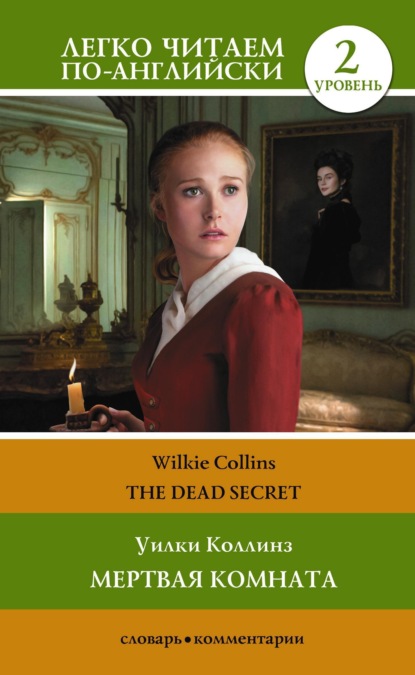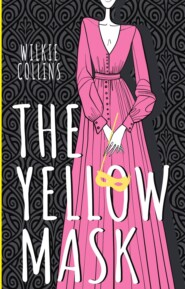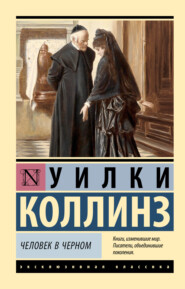По всем вопросам обращайтесь на: info@litportal.ru
(©) 2003-2025.
✖
Мертвая комната. Уровень 2 / The Dead Secret
Настройки чтения
Размер шрифта
Высота строк
Поля
“You will hardly know that Leonard is blind,” said Miss Louisa. “Except that his eyes look quieter than other people's.”
“Poor young Frankland!” said the vicar, warmly. “That good, tender, noble creature is a consolation to him in his affliction. Rosamond Treverton is the girl to do it.”
“She has made a sacrifice,” said Mr. Phippen; “but I like her for that. I made a sacrifice, too. Did she cry much, Chennery, when you were marrying her?”
“Cry!” exclaimed the vicar, contemptuously. “Rosamond Treverton is a fine, buxom, warm-hearted, quick-tempered girl. She might marry anybody she pleased. But she married him! They were engaged long before this cruel affliction befell young Frankland – their fathers, on both sides, were neighbors. Well, when the blindness came, Leonard offered to release Rosamond from her engagement. And she wrote to him a letter. Phippen, I blubbered like a baby over it when they showed it to me. I wanted to marry them immediately. But old Frankland was a fidgety, punctilious man, and he insisted on a six months' probation. He died soon, and the marriage was put off again. But no delays altered Rosamond – six years, instead of six months, did not change her. We'll drink her health after dinner, Miss Sturch – we'll drink both their healths, Phippen!”
“But, my dear Chennery,” said Mr. Phippen, mournfully, “when you were talking of the fathers of these two interesting young people, you mentioned they were neighbors here, at Long Beckley. I thought Captain Treverton was the eldest of the two brothers, and that he always lived, when he was on shore, at the family place in Cornwall?”
“So he did,” returned the vicar, “in his wife's lifetime. But since her death, which happened – let me see-”
The vicar stopped for an instant to calculate, and looked at Miss Sturch.
“Fifteen years ago, Sir,” said Miss Sturch, with her smile.
“Of course,” continued Doctor Chennery. “Well, since Mrs. Treverton died, fifteen years ago, Captain Treverton has never been near Porthgenna Tower. And at the first opportunity he sold the place – sold it, mine, fisheries, and all – for forty thousand pounds.”
“You don't say so![12 - You don't say so! – Не может быть!]” exclaimed Mr. Phippen. “Did he find the air unhealthy? Who bought the place?”
“Leonard Frankland's father,” said the vicar. “It is rather a long story, that sale of Porthgenna Tower, with some curious circumstances involved in it. Suppose we take a turn in the garden, Phippen? I'll tell you all about it later. Miss Sturch, I shall be on the lawn somewhere. Come, Phippen!”
“My dear fellow, I will say yes. Just lend me an umbrella, and allow me to carry my camp-stool in my hand,” said Mr. Phippen. “I am too weak to encounter the sun. And I can't go far. The moment I feel fatigued, Miss Sturch, I open my camp-stool, and sit down anywhere. I am ready, Chennery, my good friend, for the garden and the story about the sale of Porthgenna Tower. You said it was a curious story, did you not?”
“I said about some curious circumstances connected with it,” replied the vicar. “And when you hear about them, I think you will say so too. Come along! You will find your camp-stool, and a choice of all the umbrellas in the house, in the hall.”
With those words, Doctor Chennery led the way out of the breakfast-parlor.
Chapter V
“How charming! How pastoral! How exquisitely soothing!” said Mr. Phippen at the back of the vicarage-house, under the shadow of the umbrella. “Three years have passed, Chennery, since I last stood on this lawn. There is the window of your old study, where I had my attack of heart-burn[13 - attack of heart-burn – приступ изжоги] last time – in the strawberry season; don't you remember? Ah! And there is the school-room! Shall I ever forget dear Miss Sturch? She was coming to me out of that room – an angel with soda and ginger – so comforting, so sweetly anxious, so unaffectedly grieved that there was no medicine in the house! I enjoy these pleasant recollections, Chennery. Can you walk on the other side, my dear fellow? I like the smell, but the smoke is a little too much for me. Thank you. And now about the story? What was the name of the old place – I am so interested in it – it began with a P, surely?”
“Porthgenna Tower,” said the vicar.
“Exactly,” rejoined Mr. Phippen. “And what made Captain Treverton sell Porthgenna Tower?”
“I believe the reason was that he did not endure the place after the death of his wife,” answered Doctor Chennery. “So the Captain found a purchaser.”
“Why not his brother?” asked Mr. Phippen. “Why not our eccentric friend, Andrew Treverton?”
“Don't call him my friend,” said the vicar. “A mean, groveling, cynical, selfish old wretch! I know Andrew Treverton's history as well as you do. I know that he was treated with the basest ingratitude by a college friend, who took all, and swindled him at last in the grossest manner. I know all about that. But one instance of ingratitude does not justify him. The old brute says that the greatest benefactor to our generation will be a second Herod. Can he be the friend of any human being?”
“My friend!” said Mr. Phippen. He caught the vicar by the arm, and mysteriously lowered his voice. “My dear and reverend friend! I admire your honest indignation against the utterer of that misanthropical sentiment; but – I confide this to you, Chennery, in the strictest secrecy – there are moments when my digestion is in such a state that I have actually agreed with that person, Andrew Treverton! I wake up with my tongue like a cinder. I crawl to the glass and look at it – and I say to myself, 'Let there be an end of the human race rather than a continuance of this!'”
“Pooh!” cried the vicar and laughed. “Take a glass of cool beer next time your tongue is in that state. But let us go back to Porthgenna Tower. So Captain decided to sell the place. He could offer it to his brother, of course. Andrew was rich enough to buy it. But… It is a shocking thing to say, but the worst quarrel I ever heard of is the quarrel between those two brothers.”
“Pardon me, my dear friend,” said Mr. Phippen. He opened his camp-stool. “May I sit down? I am a little excited about this part of the story, and I dare not fatigue myself.”
“You know,” pursued the vicar, “that Captain Treverton married an actress – rather a violent temper, I believe; but a person of spotless character. According to my view of it, a very good wife for him to marry. However, the Captain's friends, of course, made the usual senseless outcry, and the Captain's brother, as the only near relation, wanted to break off the marriage. He failed in that, and left his brother's house. But he said one infamous thing about the bride, which, Phippen, I am ashamed to repeat. Whatever the words were, they were unluckily carried to Mrs. Treverton's ears. No woman forgives that. An interview followed between the two brothers – and it led, as you may easily imagine, to very unhappy results. They parted in the most deplorable manner. So they separated. Twice afterward the Captain made overtures of reconciliation. The first time when his daughter Rosamond was born; the second time when Mrs. Treverton died. On each occasion the elder brother wrote to him. No answer was received from Andrew; and the estrangement between the two brothers has continued to the present time. Well, the house, the estate, the mine, and the fisheries of Porthgenna were all for sale a few months after Mrs. Treverton's death. But the ruinous state of the house, the bad cultivation of the land, legal difficulties in connection with the mine… So Captain Treverton failed to sell the place. The death of his wife almost broke his heart. He removed, with his little girl and a relative of Mrs. Treverton, who was her governess, to our neighborhood, and rented a pretty little cottage across the church fields. The house nearest to it was inhabited at that time by Leonard Frankland's father and mother. The new neighbors soon became intimate; and thus it happened that the couple whom I have been marrying this morning, fell in love with each other. – What is it now? Do you want to get up again?”
Yes, Mr. Phippen wanted to get up again.
“I told you,” the vicar said, “that the elder Mr. Frankland and Captain Treverton were neighbors here. So old Frankland decided to buy Porthgenna Tower. But the antiquity of his family made no impression upon his neighbors. It was be an old family, but it was not a Cornish family, and, therefore, it was of no importance in their eyes. One day old Frankland, the new owner of Porthgenna, met Captain Treverton on shore. The first thing he did was to abuse Porthgenna and all the people about it a little too vehemently in the Captain's presence. This led to a coolness between the two neighbors. But the children on either side put an end to the estrangement between the fathers. Here, in my opinion, lies the most curious part of the story. The estate that was entailed on Leonard, Captain Treverton's daughter now goes back, in the capacity of mistress, to the house and lands which her father sold. Rosamond was the only child, and the purchase-money of Porthgenna, will now, when the Captain dies, be the marriage-portion of young Frankland's wife!”
Chapter VI
Miss Mowlem lived humbly at St. Swithin's-on-Sea. In 1844, Miss Mowlem's widowed mother got a small legacy. The discreet old lady finally decided to buy furniture, and hang a card in the parlor window to inform the public that she had furnished apartments[14 - furnished apartments – меблированные комнаты] to let. By the summer the apartments were ready. Soon a personage in black applied to look at the rooms, was satisfied, and engaged them for a newly married lady and gentleman. The personage in black was Captain Treverton's servant, and the lady and gentleman were Mr. and Mrs. Frankland.
From the moment when Mr. and Mrs. Frankland entered the house, Miss Mowlem began to study them with all the ardor of an industrious scholar.
The longer we live the more information there is to acquire. On the morning of the eighth day, Miss Mowlem was, as usual, near the key-hole of the drawing-room door. Then she descended to the kitchen, breathless with excitement, to announce a fresh discovery to her venerable mother.
“What do you think she's doing now?” cried Miss Mowlem.
“Nothing that's useful,” answered Mrs. Mowlem, with sarcastic readiness.
“She's sitting on his knee! Mother, did you ever sit on father's knee when you were married?”
“Certainly not, my dear. When me and your poor father married, we were not flighty young people.”
“She's got her head on his shoulder,” proceeded Miss Mowlem, more and more agitatedly, “and her arms round his neck – both her arms, mother!”
“I won't believe it,” exclaimed Mrs. Mowlem, indignantly. “A lady like her, with riches, and accomplishments! Don't tell me, I won't believe it!”
It was true though. Mrs. Frankland was sitting on her husband's knee. She sat for some time, then drew back a little, raised her head, and looked earnestly into the quiet, meditative face of the blind man.
“Lenny, you are very silent this morning,” she said. “What are you thinking about? If you tell me all your thoughts, I will tell you all mine.”
“Do you really want to hear all my thoughts?” asked Leonard.
“Yes; all. Tell me what you were thinking of just now! Me?”
“Not exactly of you.”
“Oh! Are you tired of me in eight days? Ah! You laugh. Oh, Lenny, I love you so; how can I think of anybody but you? No! I shan't kiss you. I want to know what you were thinking about first.”
“Of a dream, Rosamond, that I had last night.”
“What dream was it, Lenny?”
“A dream of the place where I first met you when we were both children. I saw the glen, and the blackberry bushes. I saw the mud on the walk in the middle of the glen. I saw the muddy water; and I saw you, Rosamond, a naughty girl, all covered with clay and wet. But, strangely enough, I did not see myself as the boy I then was. You were a little girl, and yet, though I was all in the past so far, I was in the present as regarded myself. Throughout the whole dream I was a grown man. And I was not blind.”
“What a memory you have, love, to be able to recall all those little circumstances after the years that have passed since that wet day in the glen! How well you recollect what I was as a child! Oh, Lenny, it almost breaks my heart to think of it! – when you saw me for the last time?”
“Do I remember, Rosamond! My last look at your face has painted your portrait in my memory in colors that can never change. I have many pictures in my mind, but your picture is the clearest and brightest of all.”
“And there is some consolation in that thought. When years have passed over us both, Lenny, you will not say to yourself, 'My Rosamond is beginning to fade.' I shall never grow old, love, for you! The bright young picture in your mind will still be my picture when my cheeks are wrinkled and my hair is gray. Suppose I ask you what I am like now, can you tell me without a mistake?”
“Try.”
“Poor young Frankland!” said the vicar, warmly. “That good, tender, noble creature is a consolation to him in his affliction. Rosamond Treverton is the girl to do it.”
“She has made a sacrifice,” said Mr. Phippen; “but I like her for that. I made a sacrifice, too. Did she cry much, Chennery, when you were marrying her?”
“Cry!” exclaimed the vicar, contemptuously. “Rosamond Treverton is a fine, buxom, warm-hearted, quick-tempered girl. She might marry anybody she pleased. But she married him! They were engaged long before this cruel affliction befell young Frankland – their fathers, on both sides, were neighbors. Well, when the blindness came, Leonard offered to release Rosamond from her engagement. And she wrote to him a letter. Phippen, I blubbered like a baby over it when they showed it to me. I wanted to marry them immediately. But old Frankland was a fidgety, punctilious man, and he insisted on a six months' probation. He died soon, and the marriage was put off again. But no delays altered Rosamond – six years, instead of six months, did not change her. We'll drink her health after dinner, Miss Sturch – we'll drink both their healths, Phippen!”
“But, my dear Chennery,” said Mr. Phippen, mournfully, “when you were talking of the fathers of these two interesting young people, you mentioned they were neighbors here, at Long Beckley. I thought Captain Treverton was the eldest of the two brothers, and that he always lived, when he was on shore, at the family place in Cornwall?”
“So he did,” returned the vicar, “in his wife's lifetime. But since her death, which happened – let me see-”
The vicar stopped for an instant to calculate, and looked at Miss Sturch.
“Fifteen years ago, Sir,” said Miss Sturch, with her smile.
“Of course,” continued Doctor Chennery. “Well, since Mrs. Treverton died, fifteen years ago, Captain Treverton has never been near Porthgenna Tower. And at the first opportunity he sold the place – sold it, mine, fisheries, and all – for forty thousand pounds.”
“You don't say so![12 - You don't say so! – Не может быть!]” exclaimed Mr. Phippen. “Did he find the air unhealthy? Who bought the place?”
“Leonard Frankland's father,” said the vicar. “It is rather a long story, that sale of Porthgenna Tower, with some curious circumstances involved in it. Suppose we take a turn in the garden, Phippen? I'll tell you all about it later. Miss Sturch, I shall be on the lawn somewhere. Come, Phippen!”
“My dear fellow, I will say yes. Just lend me an umbrella, and allow me to carry my camp-stool in my hand,” said Mr. Phippen. “I am too weak to encounter the sun. And I can't go far. The moment I feel fatigued, Miss Sturch, I open my camp-stool, and sit down anywhere. I am ready, Chennery, my good friend, for the garden and the story about the sale of Porthgenna Tower. You said it was a curious story, did you not?”
“I said about some curious circumstances connected with it,” replied the vicar. “And when you hear about them, I think you will say so too. Come along! You will find your camp-stool, and a choice of all the umbrellas in the house, in the hall.”
With those words, Doctor Chennery led the way out of the breakfast-parlor.
Chapter V
“How charming! How pastoral! How exquisitely soothing!” said Mr. Phippen at the back of the vicarage-house, under the shadow of the umbrella. “Three years have passed, Chennery, since I last stood on this lawn. There is the window of your old study, where I had my attack of heart-burn[13 - attack of heart-burn – приступ изжоги] last time – in the strawberry season; don't you remember? Ah! And there is the school-room! Shall I ever forget dear Miss Sturch? She was coming to me out of that room – an angel with soda and ginger – so comforting, so sweetly anxious, so unaffectedly grieved that there was no medicine in the house! I enjoy these pleasant recollections, Chennery. Can you walk on the other side, my dear fellow? I like the smell, but the smoke is a little too much for me. Thank you. And now about the story? What was the name of the old place – I am so interested in it – it began with a P, surely?”
“Porthgenna Tower,” said the vicar.
“Exactly,” rejoined Mr. Phippen. “And what made Captain Treverton sell Porthgenna Tower?”
“I believe the reason was that he did not endure the place after the death of his wife,” answered Doctor Chennery. “So the Captain found a purchaser.”
“Why not his brother?” asked Mr. Phippen. “Why not our eccentric friend, Andrew Treverton?”
“Don't call him my friend,” said the vicar. “A mean, groveling, cynical, selfish old wretch! I know Andrew Treverton's history as well as you do. I know that he was treated with the basest ingratitude by a college friend, who took all, and swindled him at last in the grossest manner. I know all about that. But one instance of ingratitude does not justify him. The old brute says that the greatest benefactor to our generation will be a second Herod. Can he be the friend of any human being?”
“My friend!” said Mr. Phippen. He caught the vicar by the arm, and mysteriously lowered his voice. “My dear and reverend friend! I admire your honest indignation against the utterer of that misanthropical sentiment; but – I confide this to you, Chennery, in the strictest secrecy – there are moments when my digestion is in such a state that I have actually agreed with that person, Andrew Treverton! I wake up with my tongue like a cinder. I crawl to the glass and look at it – and I say to myself, 'Let there be an end of the human race rather than a continuance of this!'”
“Pooh!” cried the vicar and laughed. “Take a glass of cool beer next time your tongue is in that state. But let us go back to Porthgenna Tower. So Captain decided to sell the place. He could offer it to his brother, of course. Andrew was rich enough to buy it. But… It is a shocking thing to say, but the worst quarrel I ever heard of is the quarrel between those two brothers.”
“Pardon me, my dear friend,” said Mr. Phippen. He opened his camp-stool. “May I sit down? I am a little excited about this part of the story, and I dare not fatigue myself.”
“You know,” pursued the vicar, “that Captain Treverton married an actress – rather a violent temper, I believe; but a person of spotless character. According to my view of it, a very good wife for him to marry. However, the Captain's friends, of course, made the usual senseless outcry, and the Captain's brother, as the only near relation, wanted to break off the marriage. He failed in that, and left his brother's house. But he said one infamous thing about the bride, which, Phippen, I am ashamed to repeat. Whatever the words were, they were unluckily carried to Mrs. Treverton's ears. No woman forgives that. An interview followed between the two brothers – and it led, as you may easily imagine, to very unhappy results. They parted in the most deplorable manner. So they separated. Twice afterward the Captain made overtures of reconciliation. The first time when his daughter Rosamond was born; the second time when Mrs. Treverton died. On each occasion the elder brother wrote to him. No answer was received from Andrew; and the estrangement between the two brothers has continued to the present time. Well, the house, the estate, the mine, and the fisheries of Porthgenna were all for sale a few months after Mrs. Treverton's death. But the ruinous state of the house, the bad cultivation of the land, legal difficulties in connection with the mine… So Captain Treverton failed to sell the place. The death of his wife almost broke his heart. He removed, with his little girl and a relative of Mrs. Treverton, who was her governess, to our neighborhood, and rented a pretty little cottage across the church fields. The house nearest to it was inhabited at that time by Leonard Frankland's father and mother. The new neighbors soon became intimate; and thus it happened that the couple whom I have been marrying this morning, fell in love with each other. – What is it now? Do you want to get up again?”
Yes, Mr. Phippen wanted to get up again.
“I told you,” the vicar said, “that the elder Mr. Frankland and Captain Treverton were neighbors here. So old Frankland decided to buy Porthgenna Tower. But the antiquity of his family made no impression upon his neighbors. It was be an old family, but it was not a Cornish family, and, therefore, it was of no importance in their eyes. One day old Frankland, the new owner of Porthgenna, met Captain Treverton on shore. The first thing he did was to abuse Porthgenna and all the people about it a little too vehemently in the Captain's presence. This led to a coolness between the two neighbors. But the children on either side put an end to the estrangement between the fathers. Here, in my opinion, lies the most curious part of the story. The estate that was entailed on Leonard, Captain Treverton's daughter now goes back, in the capacity of mistress, to the house and lands which her father sold. Rosamond was the only child, and the purchase-money of Porthgenna, will now, when the Captain dies, be the marriage-portion of young Frankland's wife!”
Chapter VI
Miss Mowlem lived humbly at St. Swithin's-on-Sea. In 1844, Miss Mowlem's widowed mother got a small legacy. The discreet old lady finally decided to buy furniture, and hang a card in the parlor window to inform the public that she had furnished apartments[14 - furnished apartments – меблированные комнаты] to let. By the summer the apartments were ready. Soon a personage in black applied to look at the rooms, was satisfied, and engaged them for a newly married lady and gentleman. The personage in black was Captain Treverton's servant, and the lady and gentleman were Mr. and Mrs. Frankland.
From the moment when Mr. and Mrs. Frankland entered the house, Miss Mowlem began to study them with all the ardor of an industrious scholar.
The longer we live the more information there is to acquire. On the morning of the eighth day, Miss Mowlem was, as usual, near the key-hole of the drawing-room door. Then she descended to the kitchen, breathless with excitement, to announce a fresh discovery to her venerable mother.
“What do you think she's doing now?” cried Miss Mowlem.
“Nothing that's useful,” answered Mrs. Mowlem, with sarcastic readiness.
“She's sitting on his knee! Mother, did you ever sit on father's knee when you were married?”
“Certainly not, my dear. When me and your poor father married, we were not flighty young people.”
“She's got her head on his shoulder,” proceeded Miss Mowlem, more and more agitatedly, “and her arms round his neck – both her arms, mother!”
“I won't believe it,” exclaimed Mrs. Mowlem, indignantly. “A lady like her, with riches, and accomplishments! Don't tell me, I won't believe it!”
It was true though. Mrs. Frankland was sitting on her husband's knee. She sat for some time, then drew back a little, raised her head, and looked earnestly into the quiet, meditative face of the blind man.
“Lenny, you are very silent this morning,” she said. “What are you thinking about? If you tell me all your thoughts, I will tell you all mine.”
“Do you really want to hear all my thoughts?” asked Leonard.
“Yes; all. Tell me what you were thinking of just now! Me?”
“Not exactly of you.”
“Oh! Are you tired of me in eight days? Ah! You laugh. Oh, Lenny, I love you so; how can I think of anybody but you? No! I shan't kiss you. I want to know what you were thinking about first.”
“Of a dream, Rosamond, that I had last night.”
“What dream was it, Lenny?”
“A dream of the place where I first met you when we were both children. I saw the glen, and the blackberry bushes. I saw the mud on the walk in the middle of the glen. I saw the muddy water; and I saw you, Rosamond, a naughty girl, all covered with clay and wet. But, strangely enough, I did not see myself as the boy I then was. You were a little girl, and yet, though I was all in the past so far, I was in the present as regarded myself. Throughout the whole dream I was a grown man. And I was not blind.”
“What a memory you have, love, to be able to recall all those little circumstances after the years that have passed since that wet day in the glen! How well you recollect what I was as a child! Oh, Lenny, it almost breaks my heart to think of it! – when you saw me for the last time?”
“Do I remember, Rosamond! My last look at your face has painted your portrait in my memory in colors that can never change. I have many pictures in my mind, but your picture is the clearest and brightest of all.”
“And there is some consolation in that thought. When years have passed over us both, Lenny, you will not say to yourself, 'My Rosamond is beginning to fade.' I shall never grow old, love, for you! The bright young picture in your mind will still be my picture when my cheeks are wrinkled and my hair is gray. Suppose I ask you what I am like now, can you tell me without a mistake?”
“Try.”

















